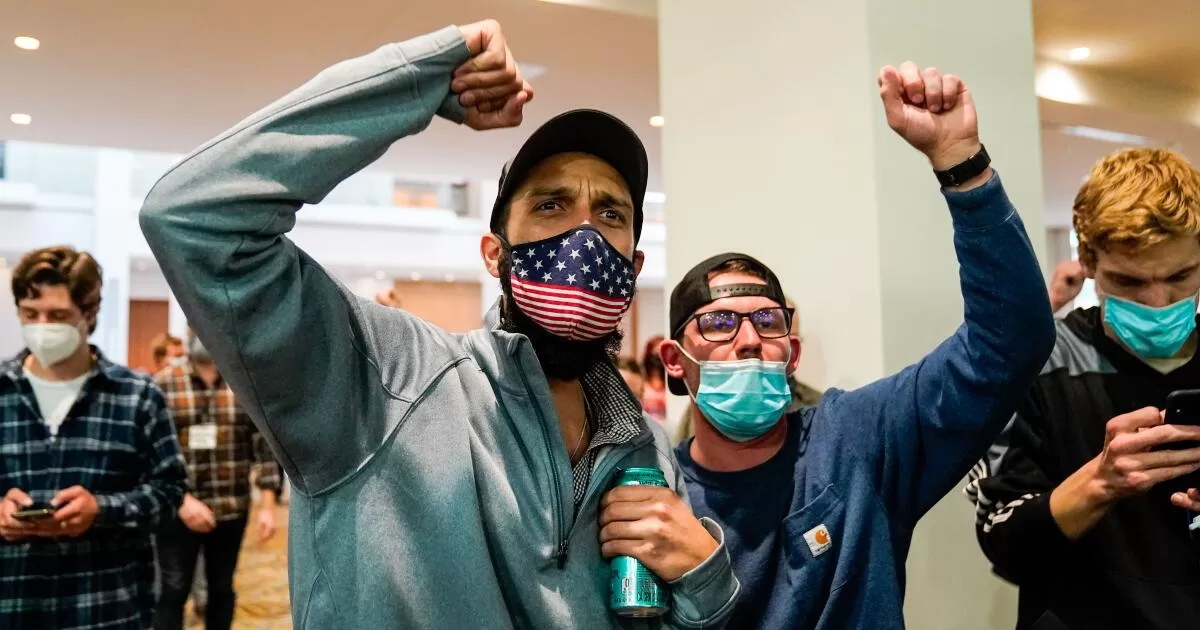Trump’s growing litigation in states faces a similar problem. It may work as a messaging strategy to show he is still fighting. But it is unlikely to provide him a legal remedy if more states tip toward former Vice President Joe Biden.
For the record:
9:24 a.m. Nov. 5, 2020In a previous version of this article, Trump advisor Kellyanne Conway’s last name was misspelled as Conaway.
Trump has long believed that splashy threats about litigation — even if they were based on thin claims or if he failed to follow up on them in court — would give him leverage, make headlines or apply pressure.
“I’ve claimed certain states and he’s claiming states and we can both claim the states, but ultimately I have a feeling judges are going to have to rule,” Trump said Thursday night in a statement rife with false and unsubstantiated claims of fraud. “But there’s been a lot of shenanigans and we can’t stand for that in our country.”
But as his path to reelection narrows, he has won only limited concessions in court and has not provided evidence of wrongdoing that could strengthen a legal case to move the results in his favor. Even as he insisted Thursday night that he is the rightful winner, he looked and sounded subdued, and did not take questions from reporters.
His campaign secured a court order on Thursday allowing the president’s team to more closely observe the processing of ballots in Pennsylvania. But the campaign followed up with another motion in federal court, arguing that local officials had failed to comply with the earlier order.
Several hundred thousand ballots remain uncounted there, and Trump’s lead has been steadily shrinking.
Trump’s campaign said it would file another lawsuit alleging there was illegal voting in Nevada, where the race remains too close to call, but did not provide any evidence to back up the claim.
Trump was trailing Biden in Arizona and Nevada when he sent out an all-caps tweet early Thursday demanding that counting stop. He needs to catch up in at least one of them to keep Biden from reaching the necessary 270 electoral votes.
In addition, Trump would need to hold on to his shrinking leads in Pennsylvania and Georgia, where Biden is well within striking distance. Trump appeared headed to victory in North Carolina, another battleground state where a winner has not been projected.
Trump issued a follow-up all-caps tweet falsely claiming that any vote that arrived after election day “will not be counted.” Twitter flagged it as misinformation, a frequent occurrence for a president who has leaned heavily on baseless claims of voter fraud.
He amended that message during his Thursday night statement as he tried to square his contradictory message with another unfounded claim that counting ballots amounted to stealing the election.
As the president remained largely holed up in the White House, his campaign hosted a flurry of news conferences in contested states — three in Philadelphia, one Las Vegas, one in Phoenix and another in Atlanta — using such surrogates as Richard Grenell, Trump’s combative former national intelligence director.
Trump’s two adult sons and other close allies were livid that so few elected Republicans had echoed Trump’s unsupported charges that the election was being stolen.
“The total lack of action from virtually all of the ‘2024 GOP hopefuls’ is pretty amazing,” Donald Trump Jr. tweeted. “They have a perfect platform to show that they’re willing & able to fight but they will cower to the media mob instead.”
He later tweeted that his father should “go to total war over this election.”
The drawn-out ballot counts present a tough math equation and a messy public relations problem for the president, who has bled credibility during his four years in office with contradictory and often false statements.
During the campaign, Trump insisted the outcome needed to be settled on election day, Nov. 3, even though most elections require days to count ballots. The challenge grew this year because a record number of Americans, mindful of the COVID-19 pandemic, cast mail-in ballots instead of voting in person.
But as Trump fell behind Biden on election night, and Fox News projected Biden as the winner in Arizona, his advisors unsuccessfully demanded that the call be rescinded and that media organizations should wait until all votes were counted.
The discordant messages put Trump at a disadvantage as he tries to convince voters that he may be the rightful winner of the election.
In the 2000 Florida recount between George W. Bush and Al Gore, Republicans offered a consistent, if contentious, message.
Bush led by several hundred votes, out of more than 6 million cast, in the state that would decide the winner in the electoral college. His campaign argued in court that Democratic attempts to find uncounted ballots could lead to an illegal reversal of the election.
The single theme won public support while they fought off legal challenges and eventually prevailed in a divided Supreme Court. The high court stopped the recount, and Bush won the state — and thus the White House — by 537 votes.
Twenty years later, Trump lacks the consistent message to make the public relations case.
His supporters banged on windows and chanted, “Stop the count!” outside an election office in Detroit. Hours later, another group of Trump supporters gathered outside an election office in Phoenix, chanting, “Count the vote!”
Trump was similarly out of sync with his own advisors. Even as he demanded that counting stop, former White House advisor Kellyanne Conway urged patience.
“We can’t wait three hours, three days, three weeks, to get a result?” she said on Fox News. “What is the rush all of a sudden?”
